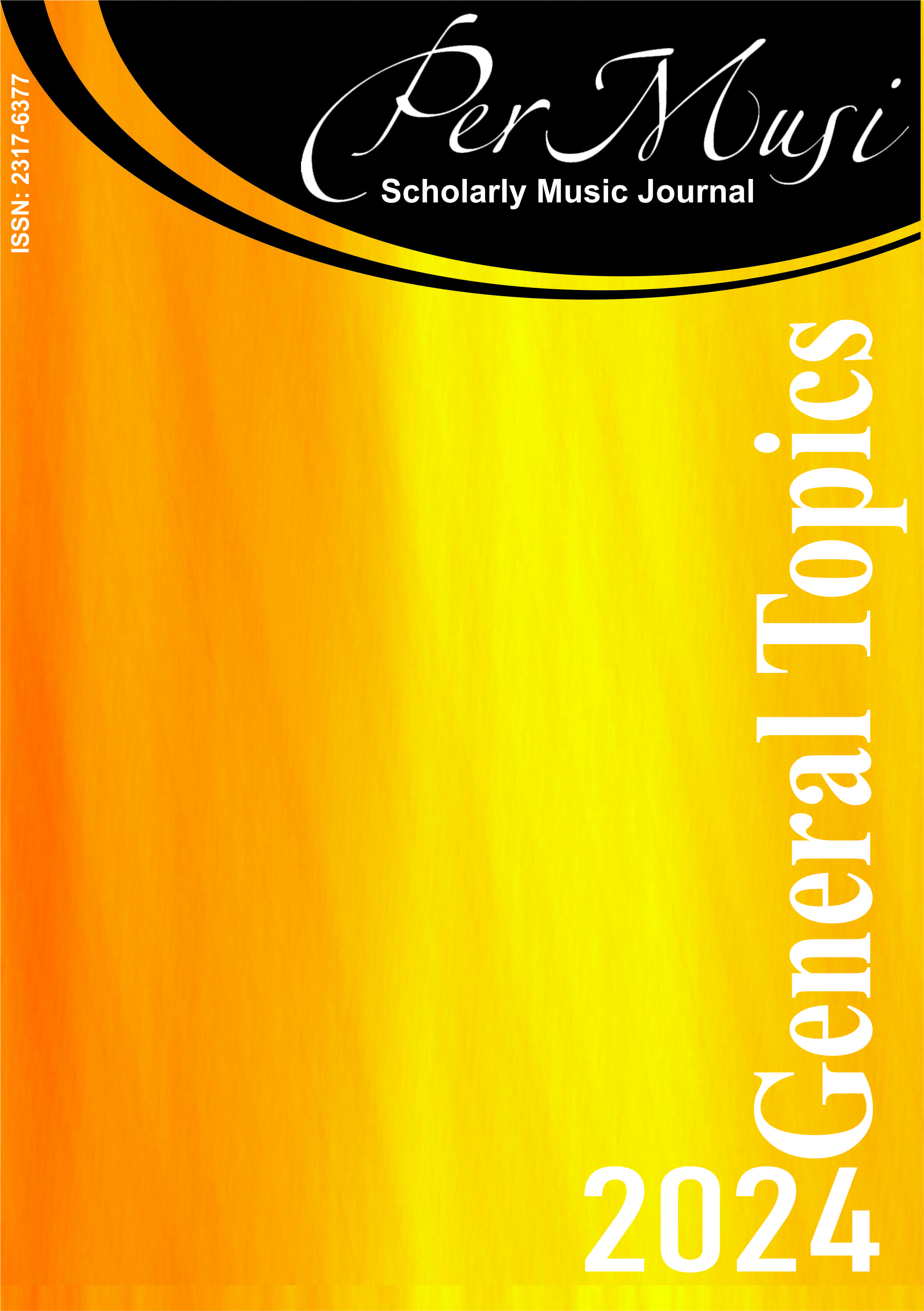Corais amadores
metodologias para aprender sua regência
DOI:
https://doi.org/10.35699/2317-6377.2024.53467Palavras-chave:
Coros amadores, Ensino da direção, Canto coral, Estudo de processos, Pesquisa em educação musicalResumo
Este artigo investiga as técnicas e procedimentos utilizados pelos regentes de coros amadores no aprendizado de suas partituras. Uma metodologia mista permite uma abordagem dupla: por um lado, analisamos as técnicas recomendadas na bibliografia de três manuais de aprendizado de partituras. Por outro, foram realizadas cinco entrevistas semiestruturadas com cinco regentes mulheres de Valência (Espanha), todas com mais de seis anos de experiência. Os resultados evidenciam diferenças notáveis entre as recomendações teóricas e a prática (no caso das cinco entrevistadas). Concluímos que a teoria não cobre as necessidades dos regentes de coros amadores. Um índice de técnicas e procedimentos é oferecido para atender às necessidades do setor, tanto teórica quanto praticamente.
Referências
Alba, Joseph W., y Hasher, Lynn. 1983. “Is memory schematic?” En Psychological Bulletin 93 (2): 203-231. Washington, D.C.: Psychological American Association. doi: 10.1037/0033-2909.93.2.203.
Bernardi, Nicolò Francesco, Schories, Alexander, Jabusch, Hans-Christian, Colombo, Barbara y Altenmüller, Eckart. 2013. “Mental practice in music memorization: an ecological-empirical study.” En Music Perception 30 (3): 275-290. California: University of California Press. doi: 10.1525/MP.2012.30.3.275.
Busch, Brian R. (1984) 1995. El director de coro: gestos y metodología de la dirección. Traducido por: Alicia Santos. Madrid: Real Musical.
Gingsborg, Jane, Chaffin, Roger y Nicholson, George. 2006. “Shared performance cues in singing and conducting: a content analysis of talk during practice.” En Psychology of Music 34 (2): 167-194. Sage publications. doi:10.1177/0305735606061851.
FSMV. n.d. "Presentación de la FSMCV". FSMCV. Accedido 11/06/2024. https://fsmcv.org/federacion-de-sociedades-musicales-de-la-comunidad-valenciana/presentacion/
Garmendia Pizarro, Elisa y Alvira Martín, Mª Pilar. 1998. Técnica vocal y dirección coral para coros no profesionales. Madrid: Editorial Alpuerto.
Hallam, Susan. 1997. “The development of memorization strategies in musicians: implications for education.” En British Journal of Music Education 14 (1): 87-97. Cambridge: Cambridge University Press. doi: 10.1017/S0265051700003466.
Hill, Peter. 2017. “De la partitura al sonido.” En: La interpretación musical, editado por Rink, John. Traducido por: Barbara Zitman. 3ª ed. Madrid: Alianza Editorial.
Leinsdorf, Erich. 1981. The composer´s advocate: a radical orthodoxy for musicians. USA: Yale University Press.
Ramón Lluch, Diego, Gil-Tàrrega, Josep R y Moreno Llabata, Carmina. 1996. Cant coral. Valencia: Generalitat Valenciana, Consejería de Cultura, Educación y Ciencia.
Scherchen, Hermann. (1953) 2005. El arte de dirigir la orquesta. Traducido por: Robert Gerhard. Huelva: Idea Books.
Schuller, Gunther. 1997. The compleat conductor. New York; Oxford: Oxford University Press.
Sloboda, John A. (1985) 2012. La mente musical: La psicología cognitiva de la música. Traducido por: Beatriz Martín-Andrade y Amalia Casas. Madrid: Antonio Machado Libros.
Swarowsky, Hans. (1979) 1989. Hans Swarowsky, defensa de la obra: escritos sobre la obra, su reproducción, estilo e interpretación en la música. Traducido por: Miguel Ángel Gómez Martínez. Madrid: Real Musical.
Williamon, Aaron y Valentine, Elizabeth. 2002. “The role of retrieval structures in memorizing music.” En Cognitive Psycology. 44: 132. Nashville: G.D. Logan doi: 10.1006/cogp.2001.0759.
Williamon, Aaron. 2017. “La memorización de la música.” En La interpretación musical, editado por: Rink, John, 137-155. Traducido por: Barbara Zitman, 3ª ed. Madrid: Alianza Editorial.
Downloads
Publicado
Edição
Seção
Licença
Copyright (c) 2024 Per Musi

Este trabalho está licenciado sob uma licença Creative Commons Attribution 4.0 International License.

Exceto onde está indicado, o conteúdo neste site está sob uma Licença Creative Commons - Atribuição 4.0 Internacional.












